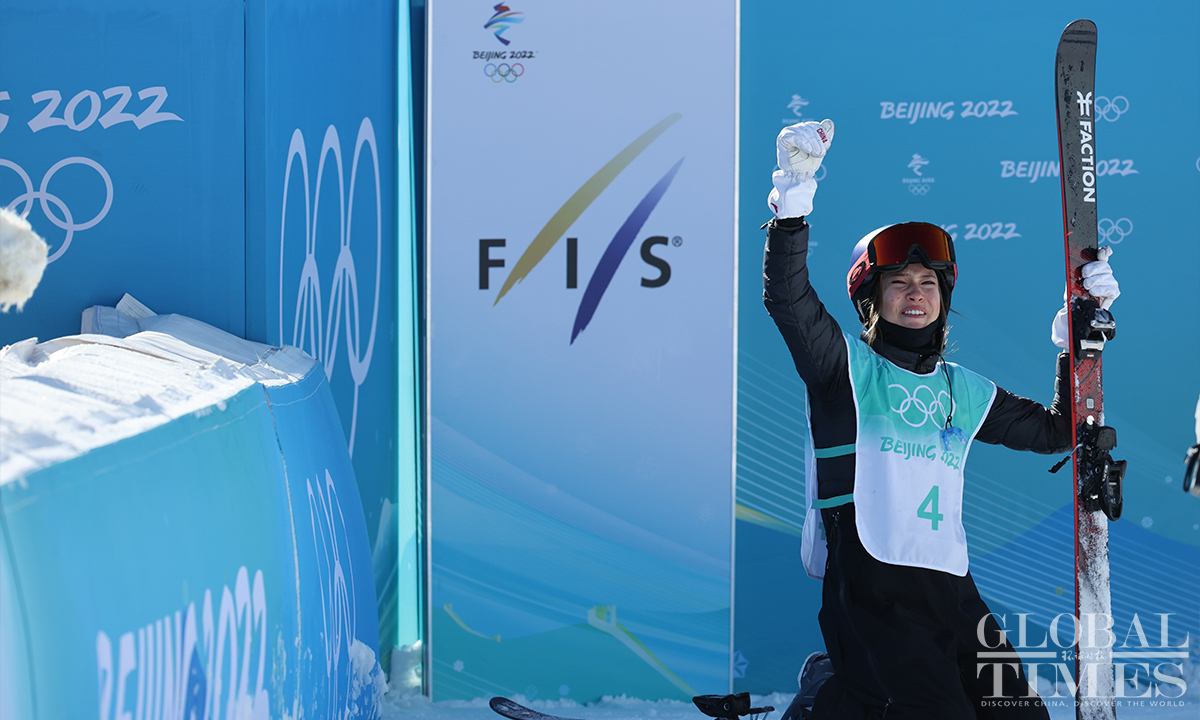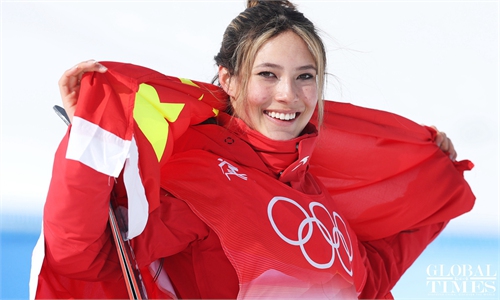Watch out for those who fan flames over ‘Gu Ailing’s role as US Olympics bid ambassador’: Global Times editorial

Gu Ailing Photo: Li Hao/GT
Gu Ailing said local time Tuesday at the TIME100 Summit that she will serve as an ambassador for the US bid to host the 2030 or 2034 Winter Olympics in Salt Lake City. She said "that's this beautiful example of globalism and of the capacity that we can...use winter sports to connect people." She also told reporters that she doesn't regret representing China at the 2022 Beijing Winter Olympics.
Throughout the history of the Olympic Games, countries and cities bidding for the Games have often invited athletes with local ties and global recognition to serve as ambassadors for their bids to help promote their image and publicity overseas. It is not unusual for Gu, who was born in the US and often competes and trains in Salt Lake City, to serve as an ambassador for the Olympic bid.
It is also common in the history of the Olympic Games for foreign athletes to serve as ambassadors for a certain country's or city's Olympic bid. For example, Chinese-American tennis player Michael Te-Pei Chang served as an ambassador for the 2008 Beijing Olympic bid. Chinese athlete Ding Junhui served as an ambassador for the London bid, Shen Xue/Zhao Hongbo as ambassadors for the PyeongChang bid, Chen Lu as an ambassador for the Sochi bid, Gao Min as an ambassador for the New York bid, and so on. After Gu was announced as an ambassador for Salt Lake City's Olympic bid, many Chinese netizens took to social media to point this out and express an open and tolerant attitude toward Gu's choice.
We have noticed that some US media outlets followed the story very quickly, but deliberately ignored this point. Those reports reinforced and exaggerated the "split" in Chinese public opinion, highlighting the "controversy" of some netizens over Gu in a seemingly "objective" tone. They linked it to the China-US geopolitical game and provocatively claimed that "a prominent Chinese figure helping a US cause is rare" and that this "could eventually damage her popularity in China," among other things.
These reports are trying to purposefully "set the tempo" in China's public opinion, in a bid to serve their inconveniently stated genuine intentions. This is not only the self-projection of the narrow-mindedness of US domestic politics, the grave social division, and the "distrust" of ethnic minorities, but also the internal desire to guide and depict Chinese public opinion as "extreme nationalism."
In the case of Gu, they are keen to turn it into a "latest example" of China's "extreme nationalism." The US and Western media outlets have been demonizing China's image by labeling the country as "extreme nationalism," "xenophobic," "narrow" and "closed." While they hope to stimulate and divide Chinese society by hyping the "nationality issue," they also want to create the atmosphere in which Gu is "excluded" and "controversial" in China. It has to be said that these public opinion offensives have also affected some people in China, who followed the Americans in asking Gu to "take a side" between China and the US. No matter who purposefully misleads public opinion, it is worthy of our vigilance.
Chinese society has always been willing to take international sports exchanges as a way to promote mutual learning among civilizations. Chinese sports stars Lang Ping and Li Yan have both served as coaches of the US teams in Olympic and Winter Olympic Games and achieved remarkable results. Chinese society has always been happy to see their achievements.
In contrast, Gu's good performance in the Winter Olympics representing Team China has stimulated the fragile ego of some Americans, triggering many US media outlets and politicians to become red with anger and even lose their temper. Some US TV commentators used "ungrateful," "betrayal" and "shameful" to insult Gu on their shows. Nikki Haley, former US ambassador to the United Nations, publicly demanded Gu to "pick a side." People can see that some Americans are extremely narrow-minded, but they want to pass the buck to China.
Gu is only 18 years old. She still has a long way to go and there are many options for her. She has said that she wants to be a bridge between the US and China, which deserves the support and encouragement of people from both countries. Against the backdrop of overall tensions between China and the US, what we should do is to build more bridges of communication, rather than tear them down. The forces that try to exploit geopolitics to kidnap normal communication and push things to the extreme are not just targeting Gu. Whoever encounters them should stay away.

